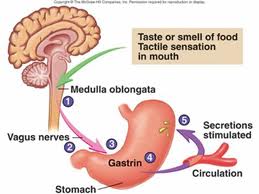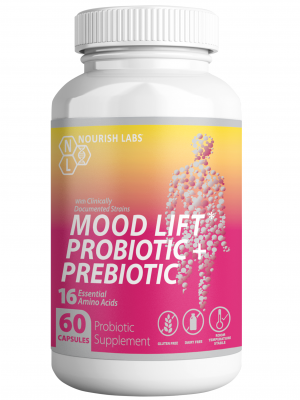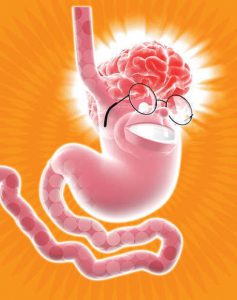
Part I of the Slow Down Diet – we talked about your stomach brain, stress and weight gain, and how being mindful when you eat can have a huge impact on your weight and your health. In short – boost metabolism when you have less stress.
In Part 2 we get a little more specific, touching upon the cephalic phase digestive response (CPDR) and how our hormones come into play.
As many of you have experienced, when you are really hungry and smell something savory, your stomach starts rumbling, or your mouth starts salivating. Digestion actually starts to happen when you are just thinking about food.
This is what CPDR is – the part of digestion that happens in our head. In fact scientists are realizing that a whopping 30-40% of our total digestive response is related to head digestion. This is why people are benefiting from taking digesting enzymes, even if their digestive systems are fine. As we age, we lose the efficiency of our enzyme release. And, since most of eat distracted, our enzymes are not as involved as they should be.
If we are not paying attention when we eat, the CPDR won’t kick in. As a result there will be decreased blood flow and oxygen to the digestive organs, and this translates to a slower metabolism. If we want to boost metabolism, we need to be paying attention.
The brain needs time to know you are full. It actually needs 20 minutes after you have eaten to fully process the intake.
And here is the final goodie.
When you stomach brain feel tension, it raises your cortisol levels. Stress and weight gain! As we mentioned before, cortisol levels can be good in small amounts, but they are bad for your waistline. When you body think it’s in stress response it holds on to calories thinking you will need the energy. It will also crave quick sugars and starchy carbs.
Even worse – your body holds on to the weight mostly in your stomach (stomach fat cells are more sensitive to cortisol). Think about how much belly weight you are holding onto by just eating fast!
So just to recap:
When you eat too fast or without mindfulness
• Your stomach brain registers stress and shuts down digestion and nutrient assimilation (causing you to feel hungry and crave food later)
• Your CPDR does not fully kick in, metabolism is slowed, and you eat more food than you actually need
• Your stress hormone is increased – telling your body to store whatever you are eating as fat
So how do you use this information in real life? Here are 3 quick ways.
1) Be More Mindful when you eat. Taste, smell, savor as much as you can. Notice the textures, aromas, and colors. Really take the meal in with all of your senses.
2) Try not to invite distractions when you eat. I know this can often be hard in real life…when we are working and often have to eat food at our desks or in a meeting. As much as you can – try to make this the exception and not a daily occurrence. Maybe even 1 day a week try to eat a non-distracted lunch. Put down your iPhone and just eat. See if you can notice a difference in how you feel.
3) Take 5 deep belly breaths before you eat. Get into your body. Allow oxygen to flow to your stomach and prepare for digestion. This will improve your metabolism and force you to slow down at the same time. This will prevent stress and weight gain.
Give it a try. Post in the comments below or on Facebook and tell us how it goes. You might be surprised what a difference it makes!
These statements have not been evaluated by the Food and Drug administration. This product is not intended to diagnose, treat, cure or prevent any disease.
Disclaimer
The content on this website strictly for educational purposes. The ideas, opinions, and suggestions contained on this website are not meant to replace medical advice. Readers of this website should not rely on any information provided here as a substitute for medical advice, diagnosis, treatment or consultation with a medical professional. Nourish Nutrition, Inc. does not encourage, nor is it liable for failure to seek medical advice from an appropriate licensed medical professional.





